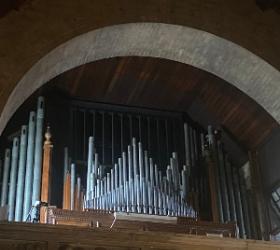
The original Grand Avenue Temple Methodist Church opened at Ninth and Grand in Kansas City in 1870. This was a Victorian Gothic brick church with an imposing spire, and it had a two-manual-and-pedal Marshall Brothers tracker organ. The congregation had outgrown this church by the early twentieth century, so in 1910–1912 a new and much larger neo-classical church of poured concrete with brick facing was constructed on the same site. A contract for the 44-rank, four-manual-and-pedal organ was signed with the Ernest M. Skinner Organ Co. of Boston in 1910, and the organ, Skinner’s Op. 190, was opened with the new church in 1912. The original Marshall Brothers organ was electrified and moved by Skinner to the Assembly Hall of the new church, where it remained until the 1930s.
Skinner Op. 190 was donated in memory of Christian Edward Schoelkopf (1833–1906), a wealthy real estate developer and philanthropist who had been a member of the Grand Avenue Church. The dedication recital was played by Edward F. Kreiser (1860–1917), a well-known local organist and composer who was organist of the Independence Boulevard Christian Church in Kansas City. Kreiser is chiefly memorable for the fact that he was continually having affairs with other women, which eventually so enraged his wife that on March 3, 1917 she shot him dead. Mrs. Kreiser was put on trial for capital murder but, as was not unusual in crimes of passion in Missouri at the time, the jury acquitted her on the grounds that her husband’s infidelity justified the action.
A century later, Grand Avenue Temple United Methodist Church is on the National Register of Historic Places, and the citation unusually lists the Skinner organ as well as the building. Op. 190 has become a regal and venerable old lady and has of late been nicknamed “Victoria” in honor of the British Queen. Wilhelm Middelschulte, Marcel Dupré, Virgil Fox, Fernando Germani, and Jean Langlais are among the many famous organists who have given recitals on the organ. In 1949 Ernest M. Skinner, Inc. (Carl Bassett, president and treasurer; Ernest M. Skinner, technical director) added an additional twelve ranks, including a Flute Celeste, Choir mutations, and a five-rank Pedal Mixture. Apart from these changes, made by Mr. Skinner himself, the organ remains entirely in its 1912 condition, making it the oldest extant four-manual Skinner organ in the world that remains as its builder left it. Michael Quimby has been taking care of the instrument since the mid-1970s and has been carrying out a phased restoration ever since. As a result of this, the instrument was in good condition until a roof leak about fifteen years ago poured rainwater into the instrument, severely damaging the Swell. Fortunately, all this damage has now been repaired, apart from the reinstatement of the Swell 16′ English Horn, for which it is hoped funding will be available shortly. Meanwhile, there is another English Horn, at 8′ pitch, on the Choir-Solo—what luxury!
The 100th Birthday Recital took place at 3:30 pm on Sunday, March 25, 2012. The organist was John D. Schwandt, associate professor and founding director of the American Organ Institute at the University of Oklahoma. The recital, at which I was fortunately able to be present, included three pieces that Edward Kreiser had played at the original dedication recital of 1912. It opened with one of these, Kreiser’s stirring Festival March, in which the Tuba and Cornopean got a good airing. This was followed by another piece from the original recital, a transcription of Tchaikovsky’s Andante from the Symphonie Pathétique, in which we got to hear some of the quieter strings, flutes, and color stops. Dr. Schwandt followed this with Théodore Dubois’ Toccata in G, in which the organ again gave a good showing of itself. The Swan from Saint-Saëns’ Carnival of the Animals followed, and gave an opportunity for showcasing the Choir-Solo English Horn.
Dispensing with a planned intermission, we then moved on directly to the second half of the program, which opened with Mendelssohn’s Sonata, op. 65, no. 1, whose last movement enabled us to hear how stunningly rapidly Op. 190’s pitman action with double primaries continues to operate, even after a century. Then followed a piece by a composer I had not heard of before, but which had also been played at the original recital of 1912: At Twilight by J. Frank Frysinger (1878–1964), a soft and gentle piece that sounded exactly the way its title might suggest. The composer of the next piece was Powell Weaver (1890–1951). Weaver is interesting in that after a stint as organist of First Baptist Church in Kansas City, he became organist of Grand Avenue Temple Methodist Church. His composition The Squirrel is an absolutely ebullient and delightful piece for the softer registers of the organ, and it seems that it was composed with the Grand Avenue Temple Skinner in mind. Again, it sounds exactly the way its title suggests, and it gave Schwandt an opportunity to show off the mutations added by Skinner in 1949. The last 25 minutes of the recital were taken up with an improvisation on a submitted theme. The theme was submitted by Michael Quimby and turned out to be The National Anthem. Schwandt suggested that we should all rise and sing The National Anthem to start with, and speaking as a British citizen, I must say I have rarely been more moved than the result of this. It certainly beats the way in which The National Anthem is mostly sung by rock stars these days. Then we all sat down and were delighted with nearly half an hour of variations, culminating in a stunning fugue and cadenza.
This was a very long recital—even without the intermission—and it must have been a grueling experience for both the recitalist and the organ. Suffice it to say that both Schwandt and “Victoria” managed this with flying colors. Neither of them ever missed a beat.




